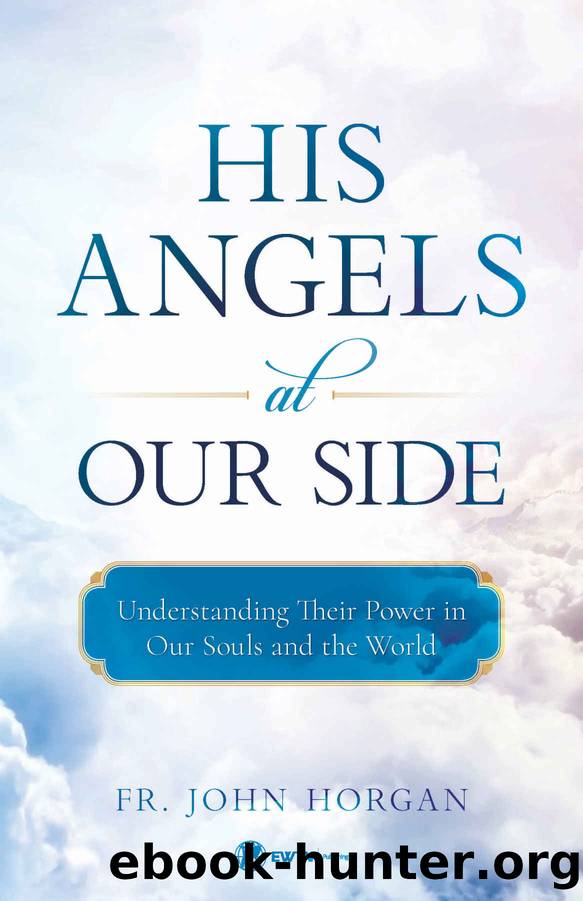His Angels at Our Side: Understanding Their Power in Our Souls and the World by Fr. John Horgan

Author:Fr. John Horgan [Horgan, Fr. John]
Language: eng
Format: epub
Publisher: EWTN Publishing, Inc.
Published: 2018-04-28T16:00:00+00:00
47 Ibid., pp. 83â84.
48 Ibid., pp. 168â169.
49 Jean Daniélou, SJ, The Angels and Their Mission: According to the Fathers of the Church, trans. David Heimann (Westminster, MD: Christian Classics, 1976), p. 41.
50 Eusebius, Comm. in Ps. 17, cited in Daniélou, The Angels, p. 35.
Chapter 9
Angels in the New Testament: The Epistles
St. Paul the Apostle has been called âThe Mystic of the Angelsâ because of his repeated references to the world of the angels throughout his epistles. Paul himself had been a Pharisee, a devout and learned Jew formed in the school of Gamaliel. Unlike the Sadducees, the Pharisees believed in the existence of angels and had developed an extensive angelology, which Paul brought with him at the time of his conversion. In his letters, Paul mentions angels frequently, and, though the references are usually brief, they are powerful. They reveal yet another dimension of how St. Paulâs transforming encounter with Christ on the road to Damascus penetrated into all the parts of his theological formation and completed and perfected his cosmology.
Paul understood the angels as worshippers of the Lord and executors of divine missions. In the Old Covenant, they had been mediators, making known Godâs will and establishing the covenant with Moses; at times they spoke with or even in the voice of the Lord as His instruments. Now that time is over; God has spoken His complete and supreme Word of truth and love in His Son, Jesus Christ, the Savior of the World.
In the Letter to the Hebrews, which is traditionally ascribed to St. Paul,51 we read:
In many and various ways God spoke of old to our fathers, by the prophets; but in these last days he has spoken to us by a Son, whom he appointed the heir of all things, through whom also he created the world. He reflects the glory of God and bears the very stamp of his nature, upholding the universe by his word and power. When he had made purification for sins, he sat down at the right hand of the Majesty on high, having become as much superior to angels as the name he has obtained is more excellent than theirs.
For to what angel did God ever say, âThou art my Son, today I have begotten theeâ? or again, âI will be to him a father and he shall be to me a sonâ? And again, when he brings the first-born into the world, he says, âLet all Godâs angels worship him.â Of the angels he says, âWho makes his angels winds, and his servants flames of fire.â But of the Son he says, âThy throne, O God, is for ever and ever, the righteous scepter is the scepter of thy kingdom.â . . . But to what angel has he ever said, âSit at my hand, till I make thy enemies a stool for thy feetâ? Are they not all ministering spirits sent forth to serve, for the sake of those who are to obtain salvation? (1:1â8; 13â14)
In his First Epistle to the Thessalonians, St.
Download
This site does not store any files on its server. We only index and link to content provided by other sites. Please contact the content providers to delete copyright contents if any and email us, we'll remove relevant links or contents immediately.
The Secret Power of Speaking God's Word by Joyce Meyer(3218)
Signature in the Cell: DNA and the Evidence for Intelligent Design by Stephen C. Meyer(3138)
Real Sex by Lauren F. Winner(3022)
The Holy Spirit by Billy Graham(2952)
The Gnostic Gospels by Pagels Elaine(2531)
Jesus by Paul Johnson(2362)
Devil, The by Almond Philip C(2331)
23:27 by H. L. Roberts(2250)
The Nativity by Geza Vermes(2230)
Chosen by God by R. C. Sproul(2164)
All Things New by John Eldredge(2162)
Angels of God: The Bible, the Church and the Heavenly Hosts by Mike Aquilina(1969)
The Return of the Gods by Erich von Daniken(1945)
Angels by Billy Graham(1926)
Knowing God by J.I. Packer(1858)
Jesus of Nazareth by Joseph Ratzinger(1811)
The Gnostic Gospel of St. Thomas by Tau Malachi(1798)
Evidence of the Afterlife by Jeffrey Long(1790)
How To Be Born Again by Billy Graham(1781)
